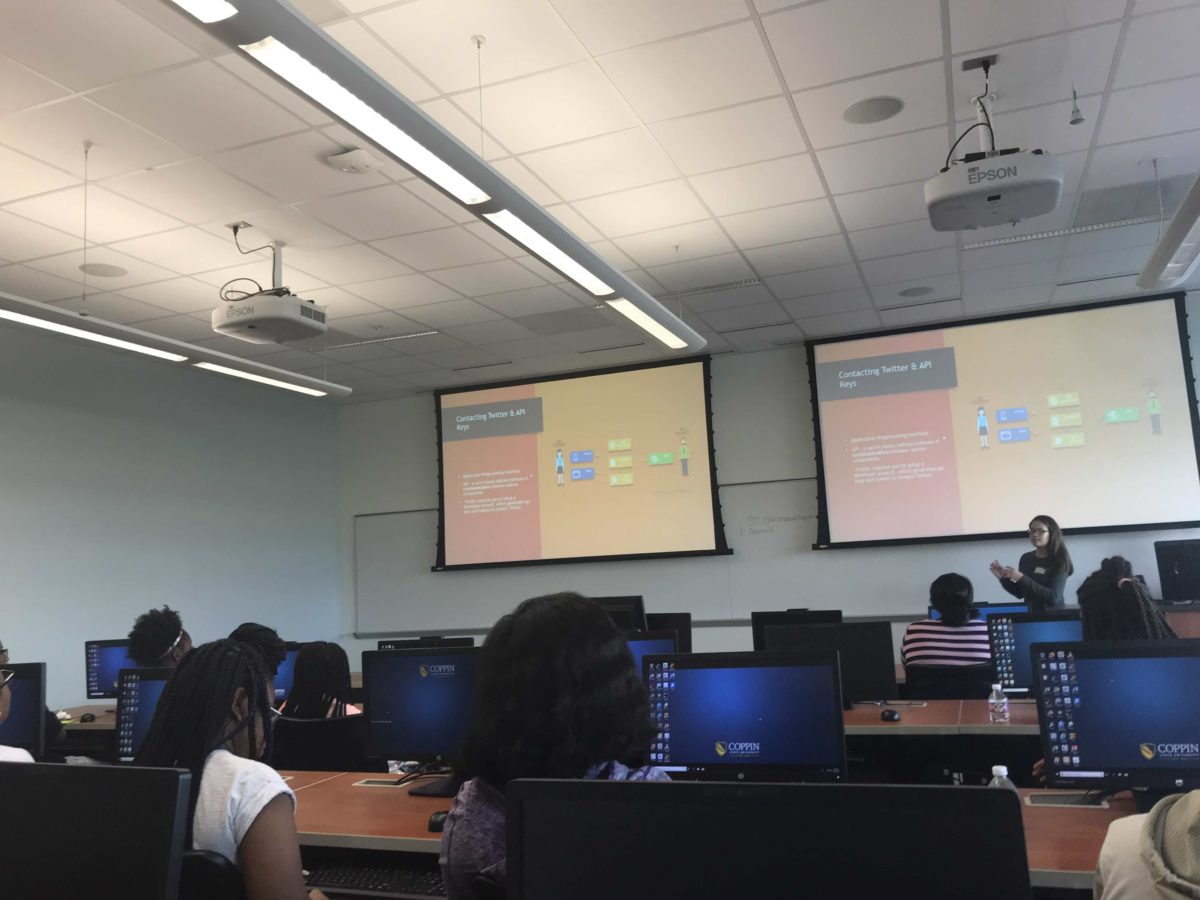There’s no one path to a tech career, and many potential landing points as one unfolds.
Dana Ledyard has spent the last two decades bringing her expertise in international development and social impact impact to the tech sector.
“I’ve really criss-crossed sectors throughout my career,” said Ledyard, who has worked with both for-profit companies and nonprofits. “In my mind, the legal status of the entity is less important for me than things like: what problem are they trying to solve? How are they driving results on things that matter to me and then of course, do I feel like I can meaningfully contribute and join a team that I’m excited to work with?”
The Baltimore resident recently started a role as chief operating officer at CodePath.org, a national nonprofit focused on supporting computer science-focused college students from historically underrepresented groups with no-cost coding courses, mentorship, and career support to prepare them for careers in tech.
She came to the role after serving as VP of strategy at Catalyte, a Baltimore-based software workforce firm that identifies people with aptitude to become an engineer through an assessment, offers a training program to provide a path into a career. Before moving to Baltimore, Ledyard also previously served as managing director of the national nonprofit Girls Who Code, which works to increase the number of women moving into computer science.
During a Technical.ly Slack AMA this month, Ledyard talked about her journey in tech.
She also offered insights for others on getting a tech job, which fits with Technical.ly’s editorial calendar theme for the month of November. Some topics that came up were the career paths in tech for those that aren’t technologists, and bringing change to how tech talent is evaluated.
Here are a few quick TLDR takeaways on getting a tech job:
- Networks matter: “Build your network or do outreach before you ‘need’ it or before the job is ever posted,” said Ledyard. She had known the CEO of CodePath for more than five years.
- There are roles in tech outside of coding and hard science: Whether it be in sales, UX design, operations, product management or testing and quality analysis, there are many career paths in tech that don’t involve learning Python or Kubernetes. “There are tons of ways to add value in tech outside of being a technologist,” said Ledyard, adding that she has found that “I really enjoy working in fast paced environments and working WITH smart technologists, even if I’m not writing lines of code myself!”
- Build the whole pipeline:From the earliest investment in K-12 to creating pathways for employees once they are on the team, it’s clear from Ledyard’s insights that growing a diverse community of engineers will require engagement throughout education, hiring processes and within existing teams. “I do think that companies need to be equally as intentional about their retention of diverse talent, as they are about their recruitment,” she said.
Check out the responses below. The conversation has been lightly edited for length and clarity.
###
Can you tell us a bit about yourself and your journey in tech?
I definitely have a non-traditional path into tech. I started my career in nonprofits, working in international development but with a group called GlobalGiving that was building one of the earliest crowdfunding/internet enabled giving websites. I became intrigued with the notion of scale for social impact and who can reach millions or billions of users as we think about the hardest problems of our time — poverty, healthcare, climate change, racism — and kept coming back to tech companies. Ended up pursuing grad school in the Bay Area (Berkeley) and exploring the intersection of tech and social change through internships at Google.org and the Salesforce Foundation.
Post grad school, Girls Who Code was just getting off the ground and I joined as Managing Director to grow the organization nationally. That was my first super deep dive into computer science education, building tech talent pathways, and diversity in tech — and have been working on those issues ever since!
How was moving from the Bay Area to Baltimore? What can a city like Baltimore learn from what’s happening in the city that’s synonymous with software companies?
Great question. I had lived in DC and then Baltimore prior to grad school, but moving out to Berkeley honestly didn’t think we’d come back! I loved the time in CA — from the tech scene to the outdoor stuff — but after five years (and two kids) we were looking to move closer to family, lower cost of living, and to build/deepen community. I love the “Smalltimore” vibe here and how committed the local tech scene is staying connected and supporting each other
And as much as I love Baltimore, one thing I think Baltimore could learn from Silicon Valley is taking a more expansive view on collaboration or our geographic footprint. Berkeley down to San Jose is 60+ miles. So Baltimore’s neighborhoods and deep connections are great, AND, I think we could be doing more to partner up and down the East Coast, with other parts of Maryland, etc.
What led you to return to the nonprofit sector and move on from Catalyte?
Great question. I’ve really criss-crossed sectors throughout my career. Fun fact: my first job was actually at a “hybrid” entity so I was technically employed by both a nonprofit and a for-profit, at the same time! In my mind, the legal status of the entity is less important for me than things like: what problem are they trying to solve? How are they driving results on things that matter to me (my top three are impact, diversity, scale) and then of course, do I feel like I can meaningfully contribute and join a team that I’m excited to work with?
What attracted me to CodePath is a couple things: returning to a smaller startup that is growing quickly (has gone from five people to nearly 20 in the past year), scale (has reached over 10,000 college students with rigorous CS courses) and impact (seeing incredibly high job and internship placement numbers as our alumni move into careers).
I loved my time at Catalyte and learned so much from the team and apprenticeship model. In some ways, the two orgs are solving a similar problem, but coming at it in different ways. We need many solutions tackling different pieces of the tech talent pipeline problem!
What seem to be the chokepoints in the tech talent pipeline? What’s preventing a more diverse workforce?
Companies aren’t investing early enough in building the pipeline. Whether it’s a focus on only hiring senior engineers, or not having an internship program, or only an internship program for CS majors junior year or older — ALL TOO LATE. We need industry to reach back and join hands with all the orgs working K-12 (shout out to Code in the Schools, Girls Who Code, Code.org) and college (CodePath!) to give students exposure to software engineering and mentors, connections, real world projects, earlier to get them excited and KEEP THEM in the pipeline.
Change how you evaluate talent. Technical interviewing is pretty broken and contributes to a lot of the lack of diversity (when gender and cultural norms around communication impact perceptions of technical skill). So companies need to rethink how they identify and evaluate talent (project work, internships, apprenticeships, etc)
Lastly, the demand for software engineers has exploded and traditional four year CS degree programs haven’t expanded. They are still graduating maybe 50,000-60,000 students annually, which hasn’t changed for years. College curriculum is often too theoretical (not industry aligned, modern) and students are often left to their own devices when it comes to finding/getting internships. We need to attract more students to CS overall, give them industry-aligned learning and work experiences, and ensure companies can tap into talent of ALL different backgrounds, and not just the same “top 20” schools their recruiting teams visit every year.
Is there anyway Catalyte could have kept you? How does a company retain talent, diverse or otherwise, especially when the common knowledge is you’ve got to leave a company every two years to get what you want?
Well fun fact is that I actually met one of CodePath’s cofounders, and now CEO, Michael Ellison when I was still in CA with Girls Who Code (5+ years ago!) and was super impressed, and we stayed in touch over the years as they launched a nonprofit in 2017 and have just gotten incredible growth and traction. Michael jokes that he had been trying to hire me for years, and this time it finally worked! So in this particular case, I don’t think there’s anything that Catalyte could have done specifically, as it was really a too good to pass up opportunity to shape and build a young organization as it scales.

And, I actually don’t necessarily believe that you have to leave every two years. I think sometimes there’s a lot of political capital, and relationships, that you can gain from staying in a place over time. I do think that companies need to be equally as intentional about their RETENTION of diverse talent, as they are about their recruitment. My greatest fear at Girls Who Code was that I was getting a generation of girls excited to go work in tech where they could be harassed, devalued, or minimized.
This means looking at everything from employee surveys and satisfaction, to comp data, to who’s getting promoted or stretch projects, mentorship/sponsorship, etc. Also my pet peeve is orgs asking women and people of color to do diversity work “for free” — form the committee, speak at that event, etc. This is a microaggression in itself to pile on unpaid labor for people that have been historically underpaid and undervalued already.
So this was definitely the power of networks. On that transition to a new job or process of getting a new job, are there any skills you use as someone whose career has been essentially getting people jobs?
Well, as much as I hate on some current practices/processes being broken (technical interviews, resume screens, etc), I still always recommend that you put your best foot forward and learn how to play the game or jump through the hoop. Don’t give an employer any reason to ding you, so make sure your resume is polished, practice interviews with a friend or more experienced engineer, ask for feedback, etc.
Second, build your network or do outreach before you “need” it or before the job is ever posted. Put yourself out there — meet people in your industry, ask for coffee meetings, say yes when people ask you for coffee meetings, etc. You never know when a friend of a friend might turn out to be the hiring manager at your target company.
To talk more about that misnomer of needing a hard science background to have a career in tech, can you talk about navigating the industry from an international development and social impact background?
Well to be super clear I am definitely NOT in a technical role nor have I ever been, despite working for a number of tech/tech training orgs. I am a Girl Who Does Not Code. So if you want to be an engineer, while you may not need the official degree, you will still need to pick up the tech skills along the way.
However, there are tons of ways to add value in tech outside of being a technologist, so I have found myself more on the business/revenue/operations and strategy sides of things. And I have found that I really enjoy working in fast paced environments and working with smart technologists, even if I’m not writing lines of code myself!
Can you identify some other nontechnical career in tech, and how these roles add value?
Sure, so I think you could think about it in two buckets. First, tech firms need ALL the roles that any firm likely needs, in all the non-technical capacities (some of these functions are getting more technical) — this is sales, marketing, HR, customer success, etc.
Second are the roles that I would call tech-adjacent but are not straight engineering. Again, how technical these are expected to be varies by place, but could include: UX/UI/design, product management / product marketing, QA/testing, operations.
Join the Technical.ly Slack






